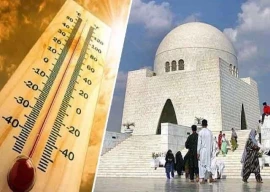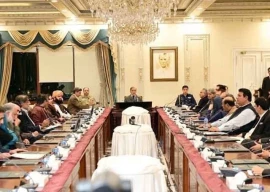
Depressed global oil prices may trigger massive layoffs of Pakistani workers in Gulf countries, which may hold back the growth in remittances, which is the largest source of financing the current account deficit, said Riaz Riazuddin, Deputy Governor of the State Bank of Pakistan (SBP) on Tuesday.
However, the second top man at the central bank hastily added the anticipated single-digit increase in remittances “is not a threat” to stability of the external sector.
He was giving a briefing to the Senate Standing Committee on Finance on the central bank’s annual report on the state of economy.
Fewer jobs for Pakistanis in Middle East
It appeared that the federal government was not too concerned about the parliamentary business. None of the top economic managers - Finance Minister Ishaq Dar, Secretary Finance Dr Waqar Masood, SBP Governor Ashraf Mahmood Wathra and Federal Board of Revenue Chairman Nisar Mohammad - attended the committee’s proceedings.
Committee Chairman Senator Saleem Mandviwalla of the PPP told fellow senators that he had written letters to the finance minister, requesting him to give importance to the parliamentary business but to no avail.
“Display the letter on the gate of Parliament House, which may compel the finance minister to attend the meeting,” suggested Senator Kamil Ali Agha of the PML-Q.
While giving the briefing, Riazuddin said the outlook of the country’s external sector appeared comfortable, adding the only difficulty came from a possible slowdown in infrastructure spending in Gulf countries in the wake of depressed oil prices, “which may hold back the growth in remittances”.
He pointed out that there was a possibility of massive job cuts but this would not disrupt the smooth flow of remittances. “The immediate impact would be on workers who might have saved money for the rainy days,” he said.
For the current fiscal year 2015-16, the government has estimated that the country will receive $19 billion in remittances, which the central bank said was achievable.
Exporting labour: Punjab to send 200,000 workers to Gulf region
“The SBP should conduct research on the chances of Pakistani expatriates coming back home and their impact on the economy,” said Senator Mohsin Leghari.
The SBP deputy governor was of the view that these workers would then start contributing to the domestic economic growth.
In the last five years, remittances have remained a critical source of meeting the external financing needs besides offsetting the impact of weakening exports. Worker remittances were also bearing the burden of financing rising imports, since a meaningful growth in exports and foreign direct investment was not happening, said the central bank.
In 2014-15, worker remittances grew 16.5% to reach the record high of $18.5 billion, financing 45% of the country’s import bill, according to the central bank’s annual report.
It added the remittance growth over the past five years was sourced primarily from the Gulf countries, which relied heavily on migrant workers to support their booming construction industry. Nearly 88% of the increase in remittances in the last fiscal year was contributed by this region.
The flow of remittances from the US and UK has slowed down. The SBP’s annual report stated that so far crude prices had not hurt the remittance growth but the trend may not continue for long if oil prices did not recover.
Overseas Pakistanis in UAE eye real estate back home
“If oil slump persists, we might have to prepare ourselves for a possible slowdown in remittances,” the central bank warned.
The SBP deputy governor also told the committee that low investment, low tax-to-GDP ratio and continuing energy shortages continued to hinder a sharp economic recovery.
He also tried to justify the cut in development spending by the government. “When revenues do not grow at the needed pace, the budget deficit has to be curtailed by taking such measures,” he said while responding to a question.
Published in The Express Tribune, February 24th, 2016.
Like Business on Facebook, follow @TribuneBiz on Twitter to stay informed and join in the conversation.

























1714117028-0/BeFunky-collage-2-(1)1714117028-0-270x192.webp)










1714370039-0/ojwilson-(1)1714370039-0-270x192.webp)
-(1)1714378140-0/AliAminMaryam-(4)-(1)1714378140-0-270x192.webp)








COMMENTS (15)
Comments are moderated and generally will be posted if they are on-topic and not abusive.
For more information, please see our Comments FAQ